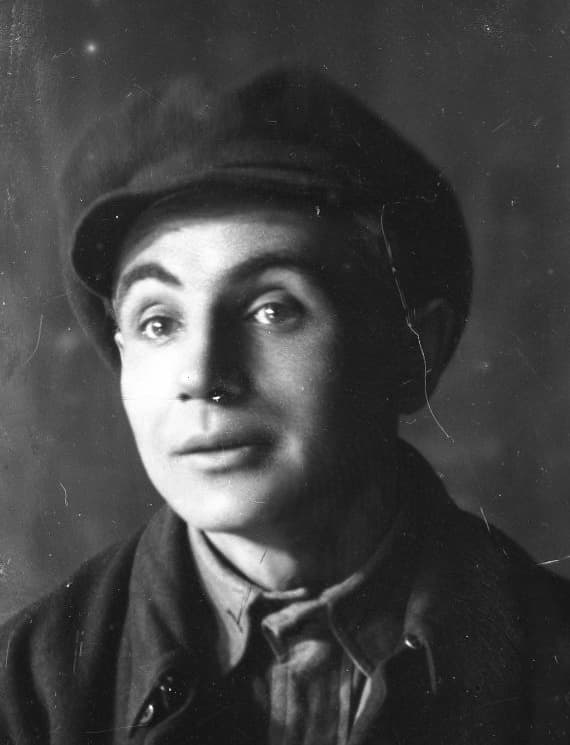Based on the short story by Yurii Zozulya
Premier: November 7, 1923
Director: Favst Lopatynskyi
Member of Director’s Lab: Zinaida Pihulovych
Artists: Vadym Meller and Valentyn Shkiaev
Episode 1
Worker – M. Ilchenko
Capitalist – O. Ivashutych
Episode 2
Old maiden – M. Nedoharko
Veterinarian – M. Derkach
Beggar – V. Omelchenko
Episode 3
Man – P. Artykula
Woman – L. Liuchyk
Family Friend – O. Podorozhnyi
Episode 4
Teacher – S. Vlasenko
Boy – M. Kovalivska
Episode 5
Deputy – A. Dzhuddi
Episode 6
Intellectual – O. Podorozhnyi
Episode 7
Capitalist – O. Ivashutych
Scientist – S. Vlasenko
Worker – M. Ilchenko
Episode 8
Priest – L. Shudebil
Old Lady – L. Krynytska
Episode 9
Banker – O. Ivashutych
Chanson Singer – O. Olinska
Reader – Les Shvachko
Chairman – Les Shvachko
Members of the Board of Delicateness:
#1 – O. Podorozhnyi
#2 – V. Taman
#3 – M. Nedoharko
#4 – L. Shudebil
#5 – M. Derkach
#6 – P. Artykula
Applicant #12345 – L. Liuchyk
#12346 – M. Ilchenko
#12347 – A. Dzhuddi
Woman – L. Krynytska
Capital – L. Shudebil
Soldier #1 – M. Ilchenko
Soldier #2 – S. Vlasenko
Youth – O. Podorozhnyi, O. Ivashutych, I. Polishchuk, Kosiak, Sukach
Two-Headed Eagle – L. Shudebil
Eagle Agitator – S. Vlasenko
Trident – M. Ilchenko
Members of the Board of Higher Resolve
#1 – L. Shudebil
#2 – M. Derkach
#3 – O. Podorozhnyi
#4 – O. Ivashutych
Boss – A. Dzhuddi
Boss’s wife – O. Trotsiuk
Boss’s sun – V. Tykhonovych
Menshevik – S. Vlasenko
Parasite – H. Mudra
Patient – O. Fostiak
Fliers – M. Derkach, F. Lopatynskyi
Mass:
P. Artykula, O. Brenaizen, S. Vlasenko, H. Hronska, Hrebeniuk, M. Derkach, A. Dzhuddi, M. Ilchenko, O. Ivashutych, M. Iliushchenko, M. Kovalevska, M. Kokhno, M. Kokhanivska, Kosiak, L. Kryvinska, L. Krynytska, L. Liuchyk, H. Mudra, M. Nedoharko, Naumenko, V. Omelchenko, O. Podorozhnyi. H. Proteven, I. Polishchuk, V. Taman, V. Tykhonovych, O. Trotsiuk, M. Skliarova, V. Strutynska, Sukach, L. Khovanova, V. Chorna, Les Shvachko, L. Shudebil, Shcherbak, O. Fostiak
The New Ones Advance was staged at Berezil’s 2nd Workshop by director Favst Lopatynskyi in 1923 and was the first and last show by this workshop. In 1924 Kurbas reorganized the Berezil Artistic Association by combining the 1st, 2nd and 4th workshops into one. All the subsequent shows were held under the auspices of the 4th Theatrical Workshop.
The script for The New Ones Advance was based on Efim Zozulya’s dystopian story The Tale of Ak and Humanity (1919), in which the authorities (the Board of Higher Resolve) initiate an inspection of the population for the right to live. People who don’t pass are considered junk and are supposed to disappear with a day. It’s difficult to say that in this satirical but terrifying story the residents of the city are shown in a positive light, although the idea of the inviolability of human life is a common thread throughout. Literary critics later suggested that the author was expressing his objection to the newly created communist regime and that Ak – the main character who gave the order to destroy people – conjured associations with Lenin.
Lopatynskyi made his own accents in the stage version and took creative liberties with the story. The actual name of the play The New Ones Advance revealed its essence: the old system and antiquated society of people, who, according to Lopatynskyi “debate over the souls of kittens but are totally indifferent to real grief,” are replaced by new ones. “A new life grows on the corpses of the old,” Lopatynskyi said. Actor Yosyp Hirniak described the plot as “the struggle between revolutionaries and the police, who, of course, persecute them as if they were criminal and spies.” In the confrontation between the revolutionaries and the police the revolutionaries win and open the path for the “new ones.”
Les Kurbas liked the young novice director’s show, but he noted some problems related to ideological emphasis. “The scenario is sharp in every way, but the ideological aspect causes, or rather could cause, some misunderstandings. Obviously, this needs to be fixed,” he wrote.
Lopatynskyi’s directorial debut was a brilliant spectacle. “This cliched propaganda,” wrote Hirniak, “provided director Lopatynskyi with material for an eccentric production in which circus equilibristics was used as a way of training a new actor for the theater of the future.” Theater critic Natalia Yermakova wrote: “One of the programmatic ideas of The New Ones Advance – the circusification of theater – was often adopted by avant-garde artists. In Ukraine, it’s first and most consistent adherent was F. Lopatynskyi.”
The director called the show’s genre a “a grand stunt film in 3 acts, 4 pictures with a prologue.” In an article about the upcoming play, Lopatynskyi underscored several very important points for him, including: agitating, but not openly, minimizing the actor’s role, and destroying the psychologism by replacing boring experiences with interesting stunts. The positive response from Kurbas and critics alike meant that many of his ideas worked. Reviewers noted: “The performance is held together by several stunts that aren’t new in essence but are new for theater. The audience is infected with a courage they’re not used to expect from actors.”
Lopatynskyi’s focus on cinema also didn’t go unnoticed. B. Rosenzweig wrote: “The first act has tones of satire and stunts, the humor is deeply serious, it is brilliantly Chaplinesque, and at times extraordinary successful…”
Hirniak recalled how the actors flew on trapeze above amazed spectators. One time these flights provoked a curious incident. A former actor of the Moscow Art Theater was so outraged by what he saw that he walked out before the show ended, making a loud exit from the hall and demonstratively opening his umbrella so that one of the Berezil actors didn’t accidentally fall on his head. His ‘performance’ was rather symbolic in the context of the show: no matter how outraged the older generation may be, they will be replaced by youth – new ones.
Kurbas wrote about his favorite student in the Theater Barricades journal before the premier: “The director of the show is Favst Lopatynskyi. Remember this name. You will meet him in the theater more than once. And always with a joyful and interesting smile.”

